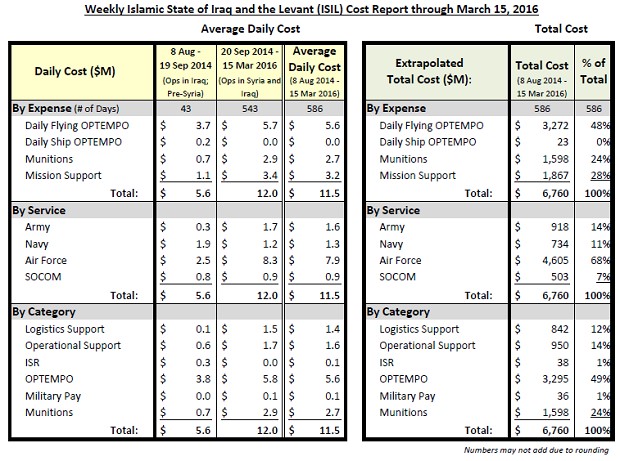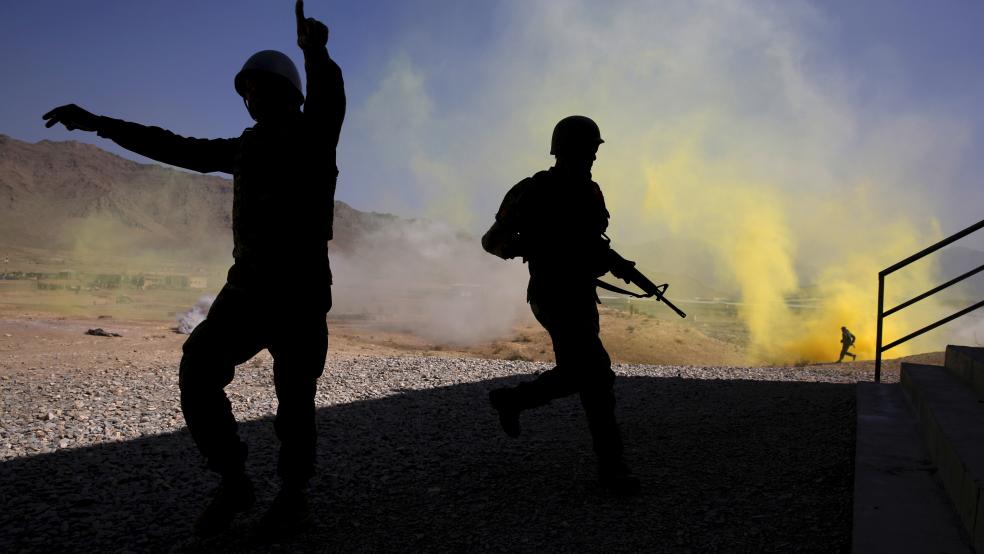The war against the Islamic State has now cost American taxpayers more than $7 billion, a figure that could increase dramatically as the U.S. prepares to send 200 more troops to Iraq to help fight the extremist network.
As of March 15, the price tag for 568 days of war was $6.8 billion, with an average cost of $11.5 million per day, according to a Defense Department report released on Tuesday. If the daily tab has held steady since then, another $402.5 million can be added to the sum, putting the total over $7.2 billion.
Related: Pentagon May Pull US Troops Due to Threat of ISIS Attack
Given the Obama administration’s airpower-first approach to battling ISIS it’s not surprising that daily flight operations accounted for 48 percent of the war’s cost, or about $3.2 billion.
Mission support – including personnel, logistics, surveillance and reconnaissance – accounted for 28 percent of the cost, or $1.8 billion, and munitions made up 24 percent, or just under $1.6 billion.
Broken down by military branch, the Air Force has spent the most by far on the anti-ISIS fight, roughly $4.6 billion. The Army has spent $918 million, the Navy $734 million and special operations forces account for $503 million, according to the Pentagon.
The cost to the other services will likely increase soon. On Monday, the Defense Department announced it would loosen the restrictions on what U.S. troops deployed to Iraq can do there and send another 200 service members to support Baghdad’s forces as they try to recapture the city of Mosul.
Related: US Says Momentum Has Shifted in the War Against ISIS
The U.S. will also provide Army Apache attack helicopters -- something the Pentagon had been pushing for months, despite resistance from the Iraqi government.
The new forces will raise the U.S. troop level in Iraq to more than 4,000 and there’s no indication it will stop there as Baghdad’s security forces prepare to retake Mosul, Iraq’s second-largest city. The city fell to ISIS in the summer of 2014 after Iraqi army soldiers abandoned their posts, allowing the jihadists to claim vast amounts of territory inside Iraq and Syria.

The boost in forces “does not change the basic elements of the strategy, which is that this has to be a fight that is led by local forces with the support and assistance of the United States and our coalition partners," White House spokesman Josh Earnest said Monday.
As usual, it’s the Obama administration’s anti-ISIS strategy, not the cost, that has invoked the wrath of Capitol Hill lawmakers on both sides of the aisle.
Related: How Long Will It Take for the Iraqis to Recapture Mosul?
Senate Armed Services Committee chair John McCain (R-AZ) welcome the additional deployment but called it “yet another example of the kind of grudging incrementalism that rarely wins wars, but could certainly lose one.”





